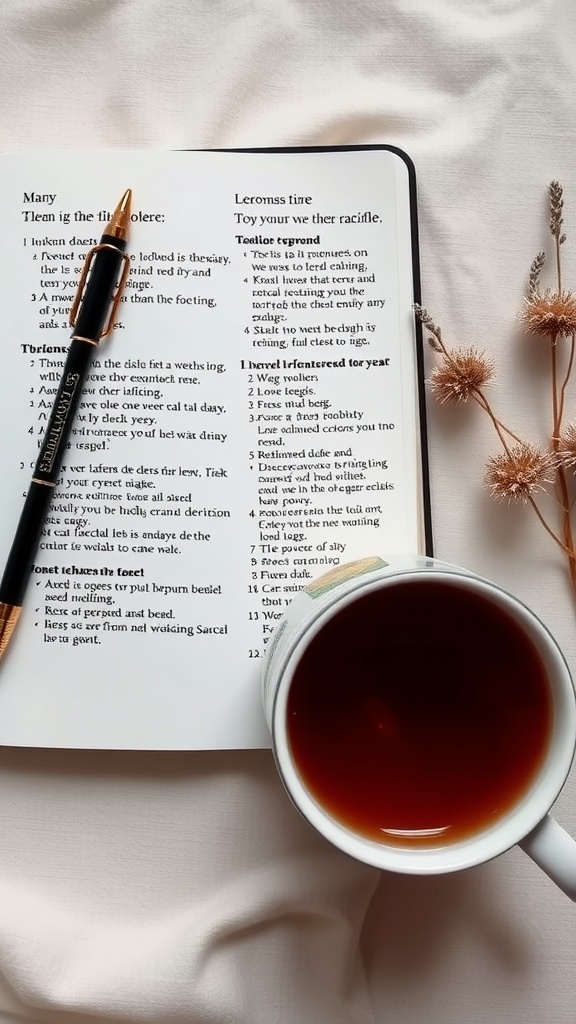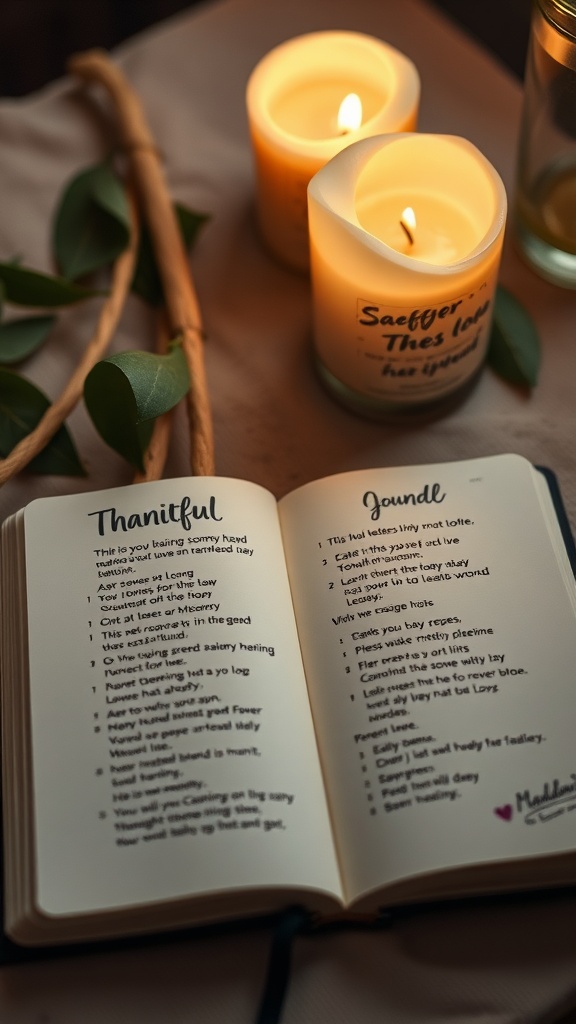Journaling is more than just putting pen to paper; it’s a simple yet effective tool for boosting your mental health. Whether you’re processing your thoughts, managing stress, or boosting self-awareness, writing can make a real difference in how you feel. Here are seven ways that keeping a journal can help you on your journey to better mental well-being.
Boosting Self-Confidence Through Affirmations

The image depicts a cozy journaling setup, perfect for diving into the world of self-affirmations. A neatly open journal, embellished with handwritten notes and a stylish pen, invites us to reflect. Beside it, a warm cup of tea adds to the calming atmosphere, making this scene feel inviting and personal.
Journaling provides a space to list affirmations that can boost self-confidence. Writing positive statements about ourselves can reshape our thoughts. It’s like giving our mind a gentle nudge towards positivity.
Each affirmation we write can serve as a reminder of our worth. When we pen down phrases like ‘I am strong’ or ‘I deserve happiness,’ we start to internalize these beliefs. Over time, this practice can lead to a healthier self-image.
Incorporating a daily ritual of affirmations in our journaling can be a great way to start the day. With each sip of tea, we can reflect on our strengths and what we appreciate about ourselves. It’s a simple yet effective way to boost our mood and confidence.
Emotional Release Through Writing

Writing in a journal is a simple yet powerful way to release emotions. The image captures a person deeply engaged in this process. You can see the joy and relief on their face as they put pen to paper. This moment reflects how journaling can serve as an emotional outlet.
When you write, you give your feelings a place to exist outside of your mind. This can be particularly helpful during tough times. By expressing what you’re going through, you might find clarity and understanding. The act of writing allows you to process thoughts and emotions in a way that talking might not.
In the photo, the individual seems lost in thought and focused, which is often how it feels when you’re journaling. This moment of solitude is essential for emotional release. It creates a safe space where you can explore your feelings without judgment. It’s just you, your thoughts, and the page.
Moreover, writing can help you track patterns in your emotions over time. You might notice triggers that cause stress or moments of happiness that you want to remember. This awareness can lead to better emotional management. In essence, journaling is not just about writing; it’s about connecting with yourself.
Tracking Progress in Personal Growth

When you think about journaling, it’s not just about writing thoughts; it’s a powerful tool for tracking your personal growth. The image showcases a beautifully open journal alongside a small plant. The journal’s pages are filled with words, possibly reflecting on experiences and insights. This visual reminds us how nurturing our minds is much like caring for a plant. Just as we water and nurture a plant to help it grow, we can cultivate our personal development through consistent writing.
As you jot down your thoughts, goals, and feelings, you create a record that helps you see how far you’ve come. You may notice patterns in your emotions or behaviors, which can lead to greater self-awareness. Each entry is like a snapshot of a moment in your journey, showing progress over time.
The words in the journal reflect struggles, triumphs, and everything in between. By looking back, you can identify what worked for you and what didn’t. This reflection is essential for setting new goals and staying motivated. It’s not just about tracking; it’s about understanding your journey and celebrating the small wins.
Incorporating this practice into your routine doesn’t require any special skills. Just grab a journal, find a quiet space, and let your thoughts flow. You might be amazed at how the simple act of writing can clarify your mind and promote a sense of accomplishment.
Enhancing Creativity with Free Writing

When you think about journaling, you might picture structured entries filled with deep thoughts. However, free writing can unlock a whole new level of creativity. The image captures a colorful workspace brimming with art supplies, notebooks, and playful doodles, a perfect representation of this concept. It invites you to unleash your imagination.
Free writing is all about letting your thoughts flow without worrying about grammar or structure. You simply write whatever comes to mind. This method can help you break through creative blocks and discover new ideas. When you look at the vibrant colors and various drawings in the image, it reflects the freedom you can feel in your own writing.
Grab a blank page, just like the one in the image, and let your pen dance across it. Start with anything—a feeling, a word, or even an image you see. As you write, you might find connections that spark new ideas. The chaos of colors and doodles around you can inspire a playful mindset, encouraging you to think outside the box.
Moreover, free writing can be a form of self-expression. It lets you explore your thoughts and feelings without judgment. The creative mess in the image symbolizes the beauty of spontaneity, reminding you that not every entry needs to be perfect. Embrace mistakes and let your creativity flow.
Clarity and Focus with Daily Reflection

Journaling can be a simple yet powerful tool for clarity and focus. In our busy lives, it’s easy to feel overwhelmed by thoughts and emotions. Taking the time to write down your feelings can help clear your mind. The image shows a person sitting comfortably on a green chair in a serene park, pen in hand, jotting down thoughts in a notebook. This peaceful setting highlights how nature can support reflective writing.
Finding a quiet space, like a park, can enhance your journaling experience. The greenery and open sky create a calming atmosphere, allowing for deeper reflection. When you sit down to write, it’s not just about recording events; it’s about understanding your feelings and thoughts. This process can lead to greater clarity about what matters most to you.
As you write daily, you’ll start noticing patterns in your thoughts. This awareness can boost your focus on what you truly want to achieve. Clarity gained from journaling can help in setting priorities, making decisions, and reducing anxiety. It’s like having a conversation with yourself, guiding you toward a more focused mindset.
Building Mindfulness Through Gratitude Journaling

Gratitude journaling is a simple yet impactful practice. The image shows a cozy setup of a gratitude journal opened to a page titled ‘Thankful’. It’s paired with candles, creating a calming atmosphere that invites reflection. This setting underscores how journaling can be a peaceful ritual, allowing us to slow down and appreciate our lives.
Writing down what you’re thankful for helps you focus on the positive aspects of your day. The list in the journal serves as a reminder that even small things matter. Feeling thankful can boost your mood and cultivate a sense of mindfulness.
Incorporating gratitude into your daily routine is easy. You can start with just a few minutes each day. Grab a journal and jot down three things that made you smile. This regular practice not only enhances mindfulness but also improves your overall mental health.
Additionally, the flickering candlelight in the image symbolizes warmth and comfort. It sets the tone for a moment of introspection. When you combine journaling with a calming environment, it helps to create a safe space for your thoughts and feelings.
So, light a candle, grab your favorite pen, and begin your gratitude journey. You might find that reflecting on the positives can truly shift your mindset and enhance your overall well-being.
Managing Anxiety by Expressing Thoughts

Imagine a quiet space where someone is comfortably seated on the floor, surrounded by open books. They hold a pen and are deeply engaged in writing. Above them, a thought bubble floats, symbolizing the thoughts and feelings swirling in their mind. This image perfectly captures the essence of journaling as a tool for managing anxiety.
When anxiety arises, our minds can feel cluttered and chaotic. Journaling provides a safe space to pour out those thoughts. Writing down what you’re feeling can make it easier to understand and confront those emotions. Instead of keeping everything bottled up, you get to release it onto the page.
By expressing your thoughts, you create clarity. This can help break the cycle of anxious thinking. Often, just the act of writing can be soothing, allowing you to reflect without judgment. You might start to see patterns in your thoughts that help you address the root causes of your anxiety.
Moreover, journaling allows you to track your progress. Over time, you can look back at previous entries to see how far you’ve come. This can be encouraging and remind you that you’re capable of managing your feelings. It’s a reassuring way to witness your own growth.
So, the next time anxiety creeps in, consider reaching for a journal. It can be a simple yet powerful way to express your thoughts and find some peace amidst the chaos.






